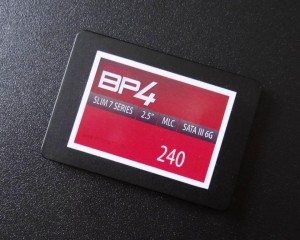 There have been more than a few interesting things that we have seen in reviewing technology over the past few years. Today’s SSD analysis is yet another, although it is not the first time this has happened.
There have been more than a few interesting things that we have seen in reviewing technology over the past few years. Today’s SSD analysis is yet another, although it is not the first time this has happened.
Can you catch the oddity in this report just yet? If not, take a closer look and follow along as we walk you through our latest SSD analysis, this on MyDigitalSSD’s newest notebook SSD, the 120GB MyDigitalSSD BP4.
Some time ago, we considered marketing our own solid state drives and each time we take a look at any of the MyDigitalSSD products, it brings us back to that mindset and whether or not it would have been a wise choice. Granted, once you put your name to your own SSD, any impartiality you have once had for other SSD brands is pretty much lost. After all, how could we possibly offer your brand an honest public analysis when I am hoping to make money off of my own?
Conversely, understanding consumer (and enterprise) need is sometimes much easier to those who started at the ground level, and still have their ear to the ground, than it is to those spending a great deal of money trying to determine what will sell. MyDigitalSSD has always had this advantage and a good example of their understanding consumer need well ahead of the game was apparent with their release of, not one, but several mSATA SSDs, this at a time when larger companies were still conducting cost feasibility studies.
Admittedly, we will always wonder how our own brand may have fared, especially since our thoughts have been pretty much on track since our first SSD report back in 2007. The trade off of course is that, as an independent and impartial publishing resource, we are afforded the luxury of saying what we want, when we want and how we want, hopefully putting out a somewhat polished product that everyone can understand and learn something from. I like it on this side.
MYDIGITALSSD BP4 INTRODUCTION
The new MyDigitalSSD BP4 SATA 3 SSD is available in capacities of 60, 120, 240 and 480GB and it is being marketed as a value driven, ground level SSD that will provide a decent price/performance comparison. Looking at Amazon![]() , we can see that the 60, 20 and 240 capacities are now available for $59.99, 89.99 and $159.99 which makes this one of the lowest priced SSDs we have seen on release yet.
, we can see that the 60, 20 and 240 capacities are now available for $59.99, 89.99 and $159.99 which makes this one of the lowest priced SSDs we have seen on release yet.
Performance for the BP4 is listed at 560MB/s read and 470MB/s write with up to 80,000 IOPS. It is fully backward compatible with SATA 2, has full TRIM support, is only 7mm thin for ultrabook use and has a standard three year warranty. For those still confused as to the oddity of this drive, click on the above picture and look closely at the PCB sticker and then the brand label. It is a 120GB SSD and contains the 240GB branding sticker which is a bit amusing. This has occured before and such may be the case when manufacturers do their best to get pre-release product to us reviewers in hopes of matching our report with release dates.
BP4 COMPONENTS
Our sample 120GB MyDigitalSSD BP4 contains a Phison PS3108-S8 controller, a 128MB module of Nanya DRAM cache along with 16 modules of Toshiba 19nm Toggle Mode NAND flash memory, each module being 8GB in capacity.
This is the first time we have seen MyDigitalSSD use memory void of manufacturers branding and this may have enabled even an even lower end pricing model which is definitely a plus.
A common thread we have seen with the use of 19nm memory is that manufacturers are utilizing over provisioning to their advantage. Where we once saw non-binary point capacities of 60, 120 and 240GB reserved for LSI SandForce driven SSDs, we are now seeing it with other SSDs as well. In the case of the BP4, the RAW capacity of the memory is 128GB, however over provisioning reduces it to its advertised total of 120GB. Formatting will leave the end user with only 112GB of available storage space.
 The SSD Review The Worlds Dedicated SSD Education and Review Resource |
The SSD Review The Worlds Dedicated SSD Education and Review Resource | 

Les, thank you for the great review sorry about the part mix up and you are right trying to get the 1st of something out the door does sometimes cause some confusion in all the excitement. Could go without saying but a proper 240GB BP4 is on the way.
Looking forward to it and nice speaking with you Matt.
The most important point about an SSD drive is RELIABILITY, not speed. All these drives perform similar.
Excellent point Conrad but unfortunately, the metric to assess reliability is time itself and that would leave the consumer with very little information to help in their search for an SSD. For our part, we have spoken to reputation of this company which can be considered an indicator of what you are getting for the price.